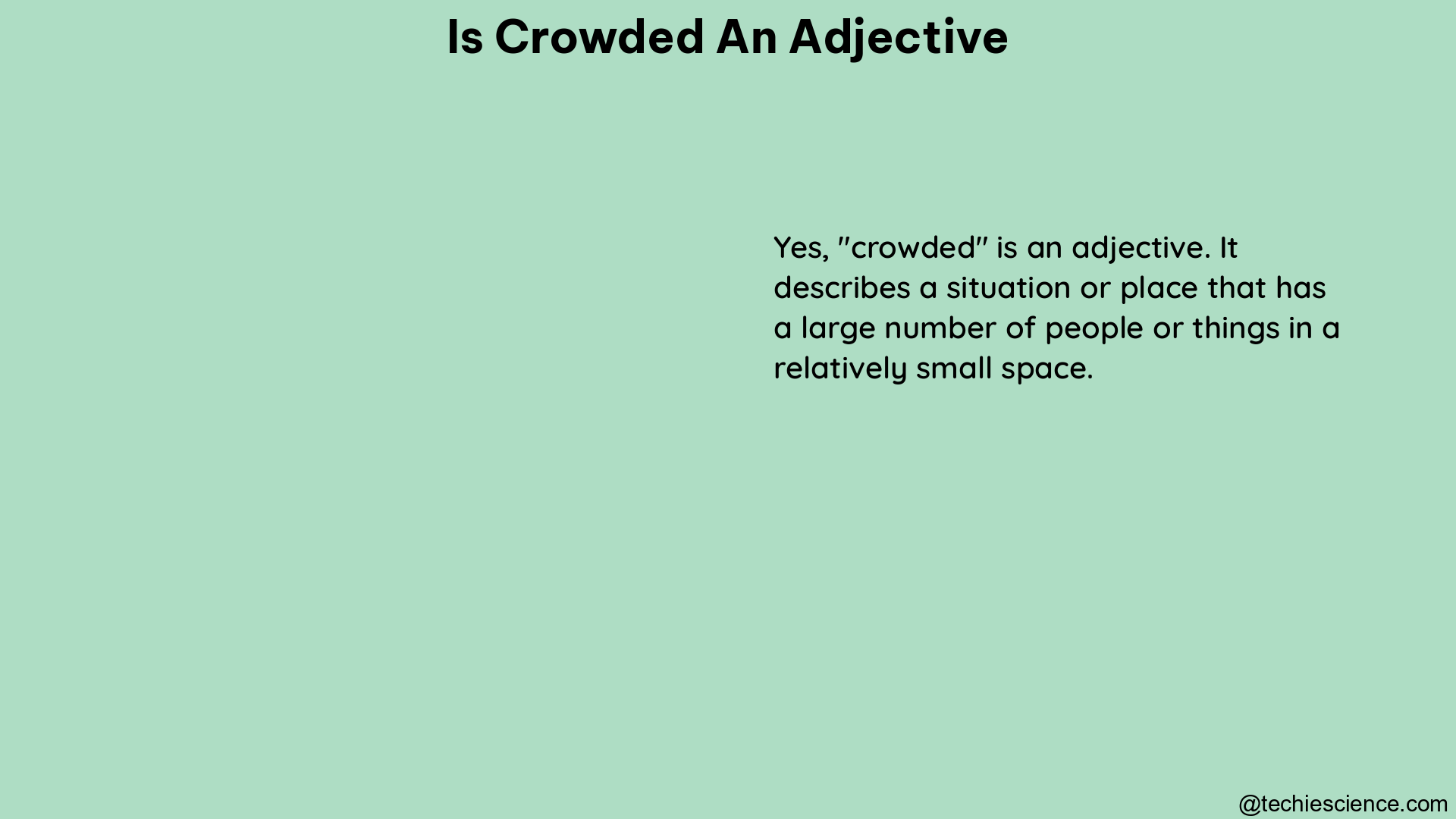Yes, “crowded” is an adjective that is used to describe a place, situation, or schedule that is full of people, things, or activities. This comprehensive guide will delve into the grammatical specifications, examples, theoretical explanations, and advanced hands-on details surrounding the use of “crowded” as an adjective.
Grammatical Specifications
Part of Speech
“Crowded” is classified as an adjective, a word that modifies a noun or pronoun.
Pronunciation
The pronunciation of “crowded” is /ˈkraʊdɪd/ in American English and /ˈkraʊdɪd/ in British English.
Synonyms
Some synonyms of “crowded” include packed, full, busy, and mobbed.
Derived Form
The adverbial form of “crowded” is “crowdedly.”
Examples of “Crowded” as an Adjective

Physical Space
“The old town square was crowded with people.” (Collins Dictionary)
Schedule
“We have a very crowded schedule.” (Oxford Learners Dictionaries)
Uncomfortable Proximity
“Crowded passengers on a bus” (Dictionary.com)
Theoretical Explanation
The adjective “crowded” can be used in various contexts to convey a sense of density or overpopulation. It can describe physical spaces like rooms, streets, or beaches that are filled with people. Additionally, it can be used to describe schedules or itineraries that are overly packed with activities or events. In some cases, it can also imply uncomfortable closeness, as seen in the example of crowded passengers on a bus.
Advanced Hands-on Details
Etymology
The word “crowded” originated between 1605 and 1615, derived from “crowd” and the suffix “-ed”.
Collocations
Verbs commonly used with “crowded” include “be,” “become,” “get,” and “live in” (Oxford Learners Dictionaries).
Idiomatic Usage
“Crowded” can be used in idiomatic expressions like “crowded with somebody” to indicate a place is filled with a particular group of people (Oxford Learners Dictionaries).
Grammatical Nuances
Comparative and Superlative Forms
The comparative form of “crowded” is “more crowded,” and the superlative form is “most crowded.”
Gradability
“Crowded” is a gradable adjective, meaning it can be modified by adverbs like “very,” “extremely,” or “slightly.”
Attributive and Predicative Use
“Crowded” can be used both attributively (e.g., “a crowded room”) and predicatively (e.g., “The room was crowded”).
Usage in Sentences
- The concert venue was crowded with excited fans.
- Our schedule is so crowded that we barely have time to breathe.
- The crowded streets made it difficult to navigate the city.
- The crowded bus was uncomfortable, with passengers standing close together.
- Despite the crowded conditions, the students managed to find a spot to sit and study.
Conclusion
In summary, “crowded” is a versatile adjective that can be used to describe a wide range of situations, from physical spaces to schedules and events. Understanding the grammatical specifications, examples, and advanced details surrounding the use of “crowded” can help English language learners and writers use this adjective effectively in their communication.
Reference:
- https://www.collinsdictionary.com/us/dictionary/english/crowded
- https://www.dictionary.com/browse/crowded
- https://www.oxfordlearnersdictionaries.com/us/definition/english/crowded

Hi…..I’m a graduate with a Bachelor’s degree in English Literature. I wish to do a Masters in the same field someday and continue my career in Academia.
Let’s connect through LinkedIn: